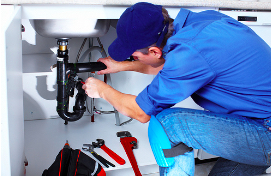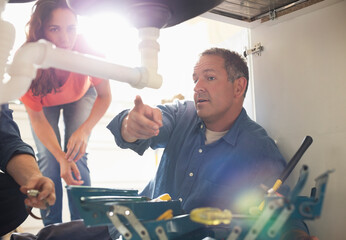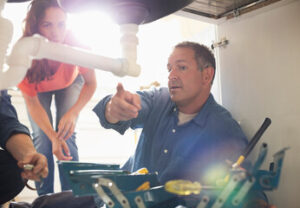Plumbers Spring TX install, fix, and fit pipes in drainage systems for houses. They also work on fittings related to water heating, cooling, and distribution.
Unlike the plumber you call for that pesky drain clogs at home, commercial plumbers deal with large-scale plumbing systems for offices, restaurants, skyscrapers, and other significant structures.
Residential plumbers are skilled professionals who install and repair plumbing fixtures. They are able to install gas and water pipes in new homes and also perform inspections on existing ones to fix any problems. Their duties include inspecting the existing system, repairing broken valves and tapware, ensuring the water pressure is optimal, and cleaning out the drains and sewer lines. They also provide repairs on toilets and showers, replace damaged sealants around sinks and baths, and upgrade water heaters when needed.
Most plumbers have undergone extensive training, both in the classroom and on the job site. Many start as licensed apprentices, under the supervision of a journeyman plumber. Upon completion of an apprenticeship program, they are qualified to work independently. In addition to being highly skilled in plumbing, they should have excellent communication skills and dexterity, as well as knowledge of basic math.
Plumbing systems are a vital part of any home or business. They take away waste water, supply freshwater for drinking and washing, and regulate indoor climate. Typically, they are installed in walls and underneath floors. The pipes that carry water and gases are made of copper, steel, or PVC. Residential plumbers are trained to install these pipes and ensure that they are properly fitted.
Whether you’re experiencing a low water pressure or smelly, discolored water, it’s important to call a plumber right away. These issues may indicate serious problems with your plumbing system. These plumbers can help you get back on track in no time.
Residential and commercial plumbers are trained to handle a variety of different jobs. They have experience working with both domestic and commercial plumbing systems, and they know how to troubleshoot problems quickly. They can help you find the best solution to your problem, so call them today!
Appliance Installation
In addition to installing appliances, plumbers also work on plumbing systems in new construction homes. This is a highly specialized field that requires special tools and training to ensure that the pipes are placed properly and that water and gas are connected correctly. A plumber with experience in new construction can help homeowners get their houses ready to be occupied as quickly as possible.
Plumbers also repair and maintain existing plumbing systems. For example, they may replace old galvanized pipes with new PEX or PVC pipes. They can also perform pipe leak detection and fix broken fixtures. In some areas, plumbers can even handle sewer line repairs.
As the economy continues to grow, many people are building new homes or remodeling their current ones. This creates a high demand for plumbers in Lee County who specialize in these types of jobs. In addition, some plumbers offer preventive maintenance services, which can help homeowners avoid expensive problems down the road. For example, they might check for small leaks under sinks or in the basement and fix them before they become big problems. They might also inspect septic systems and water heaters to make sure they are functioning correctly. These are services that many homeowners don’t think about, but they are important to have in place.
Drain Cleaning
Drains are essential for a home’s plumbing system, but they can get clogged with hair, soap scum, and other debris. Residential plumbers offer drain cleaning services to remove buildup and keep drains flowing smoothly.
The most common cause of a blocked drain is simple sediment buildup, which can be cleared with a plunger or snake. For more serious obstructions, a plumber might use a hydro jetting tool to break up and clear away blockages. This tool shoots a high-powered stream of water into the pipe to dislodge and clear away blockages without damaging the pipes.
Another way that plumbers clean drains is by using a video inspection tool. This device sends a camera down the drainpipe to provide a thorough, visual inspection of the entire length of the drain. This tool allows plumbers to identify the cause of the clog and recommend the best course of action.
Clogged drains can lead to expensive and hazardous problems for your home’s plumbing system. They can also impact your family’s health by allowing sewage and waste to back up into your home. Residential plumbers are trained to diagnose and repair both simple and complex clogs.
One of the most important tasks that residential plumbers perform is drain cleaning. Over time, drains can become clogged with hair, soap scum, fats, and other debris that can impede the flow of water. Clogged drains can lead to backups and overflowing toilets, which is a major health hazard. Residential plumbers can clear clogged drains and prevent future ones with regular maintenance services.
When a homeowner notices that a drain is taking longer than usual to empty or is producing foul odors, it’s time to call the plumber. A clogged drain is usually an indication of a larger issue, like a sewer backup or broken pipe. Residential plumbers can use video inspection to determine the cause of the clog and recommend effective solutions. Plumbers can also install new drains and replace old ones, including septic systems.
Leak Detection
Oftentimes, plumbing leaks go undetected for long periods of time, which can lead to expensive water bills and major damage to your home. Residential plumbers use a variety of leak detection tools to quickly and accurately locate water leaks in your pipes. They can also recommend the most effective ways to fix these leaks and minimize damage.
In addition to using traditional leak detection methods, such as listening for running water or watching your water meter, plumbing professionals can also employ innovative technology like sonic leak detection. These devices send sound waves through your pipes, allowing technicians to hear and pinpoint the location of a leak. This method is especially useful for finding hidden leaks, such as those in your walls and ceilings.
Other common plumbing leak detection techniques include examining the water meter for movement, turning off all faucets and water-using appliances, and checking the water meter again in a few hours to see if it has moved. Plumbers can also use video inspection cameras to examine your entire plumbing system. These handy devices are able to spot issues like broken or cracked pipes, sewer backups, and general corrosion. They can also provide valuable information about your water usage patterns and help you better plan for future needs.
Aside from clogged drains and low water pressure, leaks are one of the most common plumbing problems. These leaks can waste thousands of gallons of water and significantly hike up your monthly water bill. They can also cause serious structural damage to your home if not addressed promptly. Therefore, it is essential to call a professional plumber as soon as you notice any signs of a leaky pipe, such as damp or stained walls and ceilings, water spots on your fixtures, or high water bills.
Residential plumbing services cover a wide range of tasks, from unclogging drains and repairing toilets to installing water heaters and conducting thorough inspections of your entire plumbing system. It’s important to find a trustworthy and experienced plumbing service provider that can handle both regular maintenance and emergency repairs. To make sure you choose the right plumber, ask friends and family for recommendations, check online reviews, and research local companies and their rates and qualifications.



 Residential plumbers install, repair and maintain plumbing systems in various settings. They can also work in commercial properties, though these jobs are less common and must meet stringent state and local codes and regulations. A good residential plumber will have excellent critical thinking and troubleshooting skills and be able to handle a range of tasks, including examining pipe systems, repairing fixtures, analyzing plumbing emergencies and maintaining water heaters.
Residential plumbers install, repair and maintain plumbing systems in various settings. They can also work in commercial properties, though these jobs are less common and must meet stringent state and local codes and regulations. A good residential plumber will have excellent critical thinking and troubleshooting skills and be able to handle a range of tasks, including examining pipe systems, repairing fixtures, analyzing plumbing emergencies and maintaining water heaters.